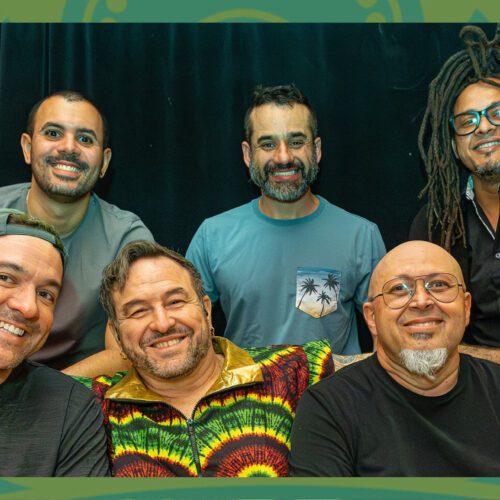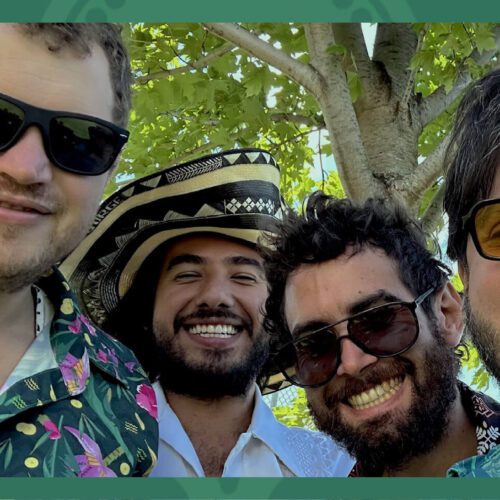Additional Information
(Photo: Lena Shkoda)
A resident of Brooklyn, Faten Kanaan rakes through the territory of minimalism and repetition. With a passion for keyboards, from the piano to analog synthesizers, this young composer with Middle Eastern roots is part of a third generation to follow this path laid out by Steve Reich and Philip Glass. A Mythology of Circles, her fourth album, this time on the British label Fire Records, was celebrated by music media interested in the post-minimalist corpus. PAN M 360 is one of these cutting-edge platforms, and Kanaan connected with us from Brooklyn, to explain her background and her creative choices.
PAN M 360: As a composer, you seem to have carefully studied contemporary minimalism and repetitious music from the USA and Europe. Can you explain your own path in that sense?
Faten Kanaan: I studied piano at a young age, and then very briefly played the cello, harp, and oud later on. I never studied composition, but leant towards minimalism in music because it relayed an intentionality that I admire. Every note chosen serves a purpose. And with repetition, the smallest change can have a profound effect.
PAN M 360: What, for you, are the next steps in these post-minimalist explorations?
FK: With genres blurring and artists exploring the depths of overlapping electronic and acoustic instruments, I think it’s a really exciting time for music to expand its potential as a language. It’s not just about harmonies and structure, but also pushing the possibilities in timbre and texture.
PAN M 360: Your culture in music is obviously broader than minimalism in contemporary music. What other music styles or forms are involved?
FK: Film scores are definitely a big influence on me, as is some folkloric music from various cultures. And the music I love listening to generally finds its way into my own sensibilities.

PAN M 360: You seem to use different keyboards (including piano and organ) and other electronic devices, it’s part of your overdubs and general sounds, can you explain?
FK: I like to be minimal with the gear I use, so that I can really get to know an instrument and fully utilise its possibilities. Every synthesizer and instrument has a sound that its voice can shine in. On my early albums, I used a vintage Sequential Circuits Prophet 600 – but I wanted something more compact and solid for touring, and with a brighter filter, so I’ve been using an OB-6 desktop synth for the last three years.
My set-up for live shows and for recording are two rather different things. For live shows, I exclusively use the OB-6 desktop synth, with a midi controller keyboard and an old Boss 20-xl looper guitar pedal (without Midi) that I have. The looper has a nice natural drift to it, and I’ve gotten so used to its timing. Sometimes its constraints hold me back a bit, so I’m considering getting a new looper that will allow me more freedom on stage, compositionally. Since my introduction to performance was through classical music/piano, it’s important for me to perform everything live, so the audience can take that journey with me and understand how a song is being built, layer by layer.
For recordings, I can fully explore a composition without these restraints. The looper’s drift doesn’t translate well into recordings for me, so I manually play the repeating parts without it.
I use the OB-6, then add some VST instruments, depending on what the song needs.
Each track is born differently… but most often, I overdub the main harmonies and chords of a song in five- to seven-minute single takes (yes, my hands get tired), until I have the spine of a track. I then start recording all the shorter segments for the arrangement, editing, and mixing as I go along. The mixing process is very much part of the arrangement. It’s a lovely experience to hear a song becoming more nuanced as its structure and spirit take shape.
PAN M 360: What’s your training as a musician? Where did you study?
FK: I studied piano as a kid and loved it. I’d thought about applying to a conservatory, but decided to attend a liberal arts university. I moved to America, and started off as a double major in Fine Arts and Biology (w a focus in genetics). I quickly dropped the bio/pre-med bit, and did a minor in French literature instead. During this time I continued playing, just for fun, and occasionally sitting-in informally with friends’ bands. I did my Masters in Fine Arts (painting & sculpture), but often felt more comfortable expressing myself through music & performance work. It would be years before I took the leap into considering music as a main path, and am so glad I finally did.
PAN M 360: As a listener, what are your favourite genres, artists or periods of music history?
FK: Oh I can’t really pick one favourite genre…film scores, ambient drones, medieval and renaissance choral music, Arabic music, French and Italian 60s pop that my parents often listened to, folk, industrial, no wave, electronica…
PAN M 360: Do you relate to a music community? Do you share creative activities with other artists?
FK: I’m so grateful for the music community in New York and other cities – artists and engineers alike. It’s heartwarming to see how supportive people are of each other while still maintaining their own practice. And with the internet making international connections easier, it’s been wonderful to reconnect with the music community in Beirut, Lebanon (and in Amman, Jordan) recently. It’s been very fulfilling to find colleagues back ‘home’. Also, the UK has been especially supportive these last few years, I’ve really made a connection with artists, labels, and the audience there.
PAN M 360: Do you still enjoy your Brooklyn neighbourhood?
FK: I do still love Brooklyn and my community here, but am hoping to move back to Europe next year.
PAN M 360: Your background is diversified. Can you explain where you come from, where your ancestors come from, where you have been raised, and how this specific background had an impact on your craft, consciously or unconsciously?
FK: I’m Syrian-Palestinian-Jordanian-Lebanese, born in Germany, and was living between Europe and the Middle East before moving to the U.S. for university. Sometimes it’s a strange feeling not belonging to one place, or being able to call one place “home”, but on a positive note, every place I have a connection with becomes a home. And musically, I can draw from all these experiences.
PAN M 360: Is asking you about being a woman composer relevant? Some women composers refuse to talk about it, even think it’s lazy journalism. Others think it’s relevant and say there are specific ways and sensibilities to women’s composing processes. What do you think?
FK: I think it’s important whenever talking about gender, race, or ethnicity, to always remember that within each group is a diversity of voices. No one woman speaks for all, each will have different experiences, boundaries, goals. For myself, I don’t like being lugged as a “woman composer”, as it’s only one aspect of my identity. At the forefront, I’m a human. The music doesn’t sound any different because I’m a woman, it sounds the way it does because it draws from the various experiences that make up who I am… just like every musician’s vision is unique to them. My gender has never dictated what I do musically, nor who I associate with or relate to. I believe in the spirit of inclusivity.























